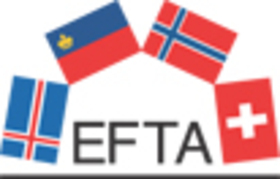European Free Trade Association, EFTA

- European Free Trade Association logo (Photo: http://secretariat.efta.int/)
EFTA was established in 1959 and started the work on 3rd May 1960. Its main headquarters (secretariat) are in Geneva.
EFTA is a free trade area within which all commodities are sold without customs duties. In opposition or competition to the EEC as a customs union, the EFTA-states have different customs duties towards other countries outside the EFTA as opposed to the EC, which have the same customs duties towards all external countries.
The UK was the initiator of EFTA. Other members were Austria, Denmark, Portugal and Sweden, who all later joined the EU. Finland, Iceland and Liechtenstein joined EFTA at a later date. Finland left in 1995 with Sweden and Austria to join the EU.
At present, only Norway, Iceland, Liechtenstein and Switzerland are still members. Whereas Norway, Iceland, Liechtenstein now have a, so-called, EEA-agreement with the EU, Switzerland has voted against membership of both the EU and EEA and has instead seven different bilateral agreements with the EU. These agreements secure free trade between Switzerland and the EU. Switzerland is now an island in the EU.
Notes
EFTA has English as its common working language.Links
http://secretariat.efta.int/